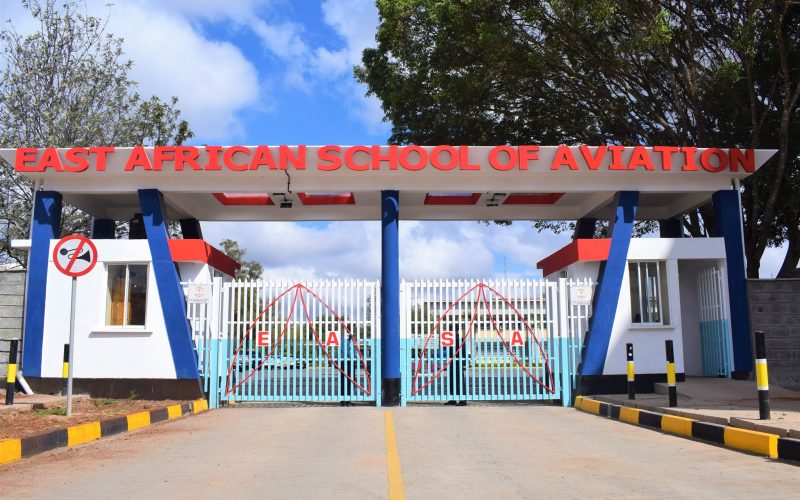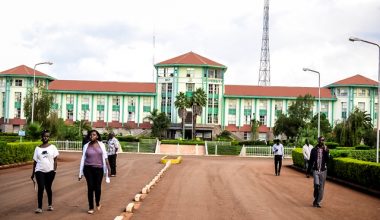The East African School of Aviation is one of the best aviation training institutions, offering exceptional and widely acceptable courses in the Republic, Africa, and the world.
The school was established in 1954 and is acknowledged as one of Africa’s best-equipped Civil Aviation Training centres. The East African Community (EAC) has designated it a Centre of Excellence for the Northern Corridor partner states.
As an applicant who may want to try their luck, having first-hand information about this Institution will put you ahead of others. So, in this article, we will show you all the East African School of Aviation courses, fee structure, requirements, and online application processes.
Table of contents
- About East African School of Aviation
- East African School of Aviation Mission
- East African School of Aviation Vision
- East African School of Aviation Courses
- East African School of Aviation Requirements
- East African School of Aviation Fees Structure
- East African School of Aviation Online Application
- FAQs
- Conclusion
- Reference
- Recommendation
About East African School of Aviation
The East African School of Aviation (EASA) is the Kenya Civil Aviation Authority’s (KCAA) training directorate and an Approved Training Organization (ATO).
EASA is the ninth institution globally to receive the International Civil Aviation Organization’s (ICAO) Regional Training Centre of Excellence (RTCE) designation. Since then, it has trained several significant figures in Kenyan aviation.
Also, It provides a diverse range of aviation, technical, and management programs that employ cutting-edge training equipment.
See also: TVET Courses in Kenya | Requirements and Fees
East African School of Aviation Mission
The East African School of Aviation Mission{EASA} is to effectively offer quality training that meets the needs of the global aviation industry by optimally leveraging resources.
See also: Daystar University Courses and Fees Structure.
East African School of Aviation Vision
EASA vision is to be the global aviation training Centre of Choice.
See also: Official List Medical Courses in Kenya and their Requirements | 2024 Fees
East African School of Aviation Courses
The institution’s enormous variety of aviation courses is one of the reasons it has been called the “mother of all aviation colleges in Kenya.” The EASA-certified institution provides courses in four different departments, including:
- Aviation Business Management (ABM)
- Aviation Safety and Security (ASSM)
- Air Navigation Services & Maintenance (ANS & M)
- Curriculum Development Unit (CDU)
Aviation Safety and Security (ASSM)
This course of study teaches students how to protect themselves and others from accidents, unintentional defects, and errors and how to operate, maintain, design, and construct aircraft. If you are interested in this field, here are the courses and the admission dates.
- Government Safety Inspectors
- ICAO Government Safety Inspector Course in Personnel Licensing (15 days): 29 Apr – 17Ap 2019 and 20 Apr – 08 Apr 2020
- ICAO Government Safety Inspector Airworthiness – Air Operator and Approved Maintenance Organization Certification (18701) (14 days): 10 – 27 Jun and 8- 25 Jun
- ICAO Government Safety Inspector operations – Air operator certification course (18700) (13 days): 10 -26 Sept and 8 – 23 Sept
- AB – INITIO & Refresher
- Diploma in Flight Operations/Dispatch (Fulltime) (12 months): 7 Jan, 2 Sept and 6 Jan, 1 Sept
- Flight Operations Officer/Dispatch Refresher Course (Module I, II, III) (A week for each module): 14 – 18 May, 12 – 16 Aug, 11 – 15 Nov and 10 – 14 Feb, 11 – 15 May, 10 – 14 Aug, 9 – 13 Nov
- Diploma in Aircraft & Passenger Handling (Fulltime) (12 months): 7 Jan, 2 Sept and 6 Jan, 1 Sept
- Aeromedicine for Civil Aviation – Refresher (3 days): 4 -7 Mar, 18 – 20 Nov and 2 – 4 Mar, 16 – 18 Nov
- Diploma in Flight Operations/Dispatch (Evening and Weekend Classes) (12 months): 7 Jan, 2 Sept and 6 Jan, 1 Sept
The Air Navigation Services (ANS) department of the East African School of Aviation (EASA) is an essential part that prepares students for careers as an aerospace engineer that ensure the safety and efficiency of aviation.
This department is divided into three major sections: air traffic management (ATM), aeronautical information management (AIM), and communication and navigation surveillance (CNS).
ATM focuses on teaching students how to manage aircraft movements on the ground and in the air, ensuring safe distances between aircraft. AIM includes working and communicating critical aeronautical information, such as flight plans and weather updates.
The CNS section teaches students how to operate and maintain communication systems, modern navigational aids, and surveillance technologies like radar and GPS, which monitor aircraft movements and ensure adherence to flight paths. Together, these sections provide students with the skills they need to excel in the complex field of air navigation.
You can also choose from a variety of career choices within this department. Each of these also offers a range of courses to choose from. Note that the entry dates are for 2024 and 2025, respectively.
Aircraft Maintenance
- Diploma In Aeronautical Engineering (Airframes & Engines) (Modular) (3 years): 7 Jan 2 Sept and 6 Jan 1 Sept
- Diploma In Telecommunication Engineering (Modular) (3 years): 7 Jan, 2 Sept and 6 Jan, 1 Sept
- Aerodrome Inspection Course (Collaboration with Incheon Airport Academy) (5 days): 5 – 9 Aug and 3 – 7 Aug
- Aircraft Maintenance License (Avionics) (6 months full time): 2 Sept and 1 Sept
- Aircraft Maintenance License (Airframes & Engines) (6 months full time): 2 Sept and 1 Sept
- Diploma in Aircraft Maintenance (B1/B2): 6th Jan 2020
See also: “D Plain Courses in Colleges in Kenya.
Department of Curriculum Development Unit {CDU}
Develops standardized training packages related to the aviation industry & conducts instructional programs for officers from broader professional backgrounds within the aviation sector and beyond. The core activities of this department include;
- Developing ICAO Recognized Standardized Training Packages for EASA as ICAO Regional Training Centre of Excellence (RTCE) per its mandate.
- Ensuring that EASA Maintains TRAINAIR PLUS Accreditation through responsibilities of ICAO TrainAir_plus Focal point as the Central Unit.
- Identify and prioritize courses for development, Review & adaptation and ensure follow-up for efficient implementation process;
- Providing expertise to training Departments to ensure, where applicable, all EASA courses are Standardized and regularly revised;
- Managing of Training Competency Development Courses
- Coordinating scheduling and implementation of ICAO Courses
- Coordinating Research and Development activities of EASA.
The entry dates are:
- TDC (5 days): 1 – 12 Apr, and 20 Apr – 1 May TIC Part II (5 days): 14 – 18 Oct, and 12 – 16 Oct
- Facilitation for Air Transport (10 days): 13 – 24 May and 11 – 22 May
- Basic PEL Course (5 days): 14 – 18 Jan and 13 – 17 Jan
- Aerodromes and Ground Aids Inspector – Part 1 (10 days): 10 – 21 Jun and 15 – 26 Jun
- ICAO Training Developers Course (TDC) (10 days): 8 – 19 Apr and 6 – 17 Apr
- ICAO Training Instructor Course (TIC Part II) (5 days): 7 – 11 Oct and 5 – 9 Oct
- Curriculum Instructor Development Program (IDP) (3 weeks): 22 Apr – 10 May, 12 – 30 Aug and 20 Apr – 8 May, 10 – 28 Aug On Job
- Training Instructor (OJTI) (5 Days): 3 – 7 Jun, 2 – 6 Dec and 1 – 5 Jun, 7 – 11 Dec
- Advance Instructor Training (AIT) (3 weeks): 17 Jun – 5 Jul and 15 Jun – 3 Jul
see also: Official List of International relations courses in Kenya | Requirements and fees
Department of Aviation Business Management
The Aviation Business Management (ABM) Department provides the skills, knowledge and expertise required to provide sound leadership and management in the aviation industry. The department develops talents to ensure the growth of the aviation industry is nurtured and sustained to achieve seamless continuity.
You have a variety of choices that you can make here. If you are interested in accelerating your career in management or aviation business, then here are the different courses to choose from:
- Quality Management Systems for Civil Aviation
- Auditing Techniques (For the Aviation Environment)
- Customer Care in Aviation
- Supervisory Management
- Executive Civil Aviation Management
- Travel & Tourism Foundation (IATA Diploma)
- Travel & Tourism Management (IATA Diploma)
- Travel & Tourism Consultant (IATA Diploma)
- Air Cargo Introductory
- Advanced Cargo Rating and Marketing (IATA Diploma)
- Dangerous Goods Regulations
- Revenue Collection in Civil Aviation
- IATA Certificate in Airline Cabin Crew
- Diploma in Airport Operations
- Diploma in Tours and Travel Management
- Diploma in Air Cargo Management
- Management of Strategic Change in Aviation
- Masters in Business Administration – Aviation Option (In Collaboration with Moi University)
- Bachelor of Civil Aviation Management (in Collaboration with Moi University).
See also: Sigalagala National Polytechnic Courses and Fee Structure | 2024
East African School of Aviation Requirements
You should be able to prepare all required documents when applying for admission to the East African School of Aviation.
Here is a list of necessary documents from the East African School of Aviation, as it may vary for different countries.
- Photographs
- Passport
- TOEFL Certificate
- Experience certificate (MA, PhD)
- Health and Life Insurance
- Application fee
- IELTS Certificate
- Family Details
- Student visa
- Online Application form
- Proof of fee payment
- see also: KCA University Courses, Fees, and Requirements | 2024
East African School of Aviation Fees Structure
The fees for EASA courses range from Ksh. 115,950 to Ksh. 158,450, depending on the program and module. Fees for all courses range from Ksh. 120,500 to Ksh. 180,500.
See also: NITA Courses and Fees Structure | 2024 Requirements
East African School of Aviation Online Application
- Visit the EASA portal here
- Click the button labelled “Create Account” to create your online account.
- Login with your registered email and set a password.
- To make an application, click on “New Application,” provide all the required information and documents, and submit.
- Pay the application fee for your application to be processed.
- To track your application status, click on “My Applications”.
- Before downloading the admission letter, save the necessary documents on your computer. Required documents include:
- KCSE certificate/result slip,
- national ID/birth certificate
- Passport-sized photo.
- Click login and input your KCSE index number.
- Follow the portal’s instructions to apply for your selected course.
FAQs
Dr. Serah Waitiki | East African School of Aviation.
Universal School Of Aviation Partners with ESFAM-BENIN on B.Sc, No JAMB Required.
The Bachelor of Science (BS) is the most common aviation degree.
B.Sc in Aviation is a challenging course that requires a strong work ethic, dedication, and a passion for aviation.
The aviation sector is growing fast and will continue to grow.
Conclusion
By going through this article, you will be able to Position yourself for success at East African School of Aviation by attending a variety of classes including aviation business management, safety and security and training in various fields.
Reference
- tuko.co.ke– East African School of Aviation courses, location, and fees
- scribd.com– EASA Diplomas Revised Fee Structure 2023-2024-Students






